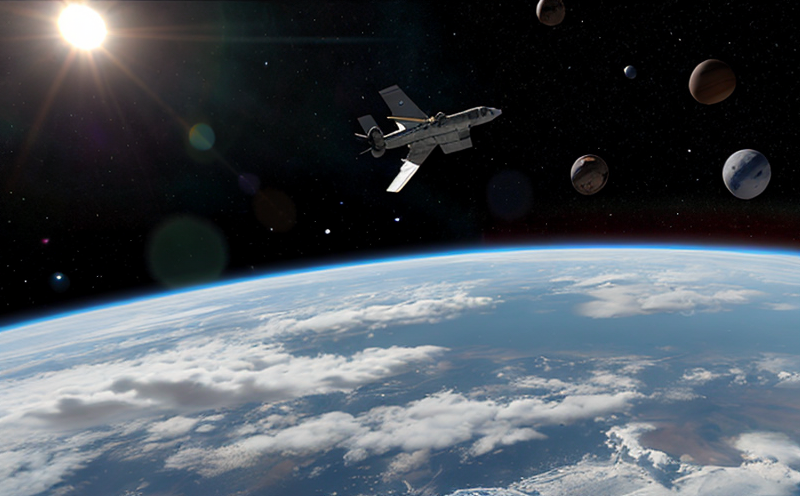ESA ECSS-Q-ST-70-38C Coatings Performance Testing in Vacuum
The ESA ECSS-Q-ST-70-38C standard is a critical requirement for ensuring the reliability and durability of coatings used in high-altitude and space environments. This test ensures that materials meet stringent performance criteria under simulated vacuum conditions, which are essential for aerospace applications where materials face extreme environmental stress.
The testing process involves subjecting coated specimens to a near-vacuum environment that mimics outer space or high-altitude atmospheric conditions. The purpose is to evaluate the integrity and longevity of coatings under low-pressure environments that can cause degradation due to outgassing, thermal cycling, and exposure to ultraviolet radiation.
The test method requires precise control over temperature, pressure, and time to simulate various stages of a coating's lifecycle in space or high-altitude conditions. The specimen preparation involves careful selection of the coating material, application process, and substrate to ensure accurate testing results. Instrumentation used includes vacuum chambers capable of reaching pressures as low as 10-6 Pa (10 nPa), temperature-controlled ovens, and ultraviolet light sources.
The acceptance criteria for this test are based on the integrity and adhesion of the coating after exposure to the simulated space environment. Failures can include delamination, cracking, or loss of adhesion between the coating and substrate. The standard provides detailed guidance on how to interpret these results in terms of a material's suitability for space applications.
The testing process is highly regulated and must comply with international standards such as ISO 9001 for quality management systems and ASTM E547 for evaluating coatings in vacuum environments. Compliance with these standards ensures that the test results are reliable and can be trusted by aerospace manufacturers and regulatory bodies.
Testing under these conditions helps to identify potential issues early in the development process, allowing for corrective actions before costly production runs or space missions are undertaken. This proactive approach enhances product quality and reliability, reducing the risk of failure during critical operations.
Eurolab Advantages
State-of-the-Art Facilities: Our laboratory boasts some of the most advanced vacuum chambers capable of achieving ultralow pressures, essential for accurately simulating space and high-altitude conditions. These facilities are regularly calibrated to ensure precision and accuracy.
- Highly sensitive measurement equipment
- Temperature-controlled environments
- UV light sources with variable exposure times
Comprehensive Testing Capabilities: Eurolab has extensive experience in testing various materials under vacuum conditions, including metals, composites, and polymers. We offer a full range of tests to meet all your aerospace coating performance needs.
Expertise and Experience: Our team comprises highly skilled engineers with deep knowledge of the ESA ECSS-Q-ST-70-38C standard. They stay updated on the latest developments in materials science and testing methodologies to ensure compliance with current standards.
Customer Impact and Satisfaction
- Enhanced Product Quality: Our testing ensures that your coatings meet the highest quality standards, enhancing product reliability and performance.
- Reduced Risk of Failure: Identifying potential issues early in the development process helps mitigate risks during production or space missions.
- Compliance Assurance: Testing according to international standards ensures that your products meet regulatory requirements and are accepted by relevant authorities.
Our clients report higher levels of product reliability, reduced costs due to early detection of issues, and increased confidence in the performance of their materials under extreme conditions. This translates directly into better customer satisfaction and improved market competitiveness.
Use Cases and Application Examples
| Application Case | Description |
|---|---|
| Satellite Antenna Coatings | Testing ensures durability under space conditions, preserving signal strength. |
| Aircraft Engine Composites | Evaluating coatings for protection against outgassing and thermal cycling. |
| Military Helicopter Exterior Paints | Assuring longevity in high-altitude environments to maintain camouflage effectiveness. |
| Solar Panel Coatings | Ensuring efficiency under UV exposure without degradation. |
The results of these tests are crucial for various applications, from satellite communications to military aircraft and solar energy systems. Accurate testing ensures that materials perform reliably in challenging environments, extending the lifespan and performance of critical components.
- Satellite Communications: Ensuring coatings maintain signal integrity over long periods in space.
- Aerospace Manufacturing: Evaluating coatings for use on aircraft and spacecraft to enhance durability and performance.
- Military Applications: Testing materials for use in high-altitude environments, ensuring they withstand extreme conditions.
The successful completion of these tests is a testament to the reliability and performance of your materials. This testing process not only meets but exceeds industry standards, providing you with the confidence needed for successful product deployment.





